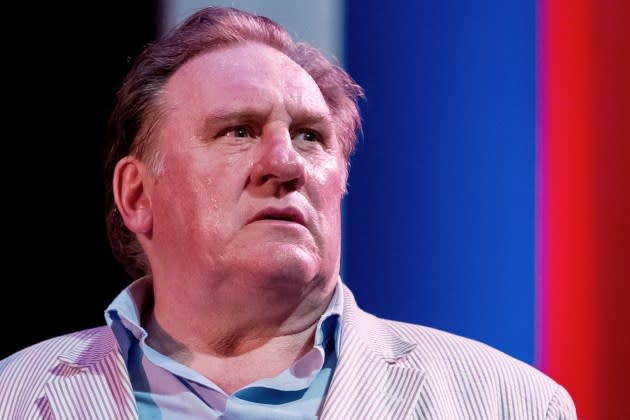Gerard Depardieu’s Downfall: French Public Broadcaster Says It Won’t Ban Films Starring the Actor, but Won’t Celebrate Him Either
- Oops!Something went wrong.Please try again later.
- Oops!Something went wrong.Please try again later.

French broadcaster France Televisions has been blamed by supporters of Gerard Depardieu, the Oscar-nominated actor of “Cyrano de Bergerac,” for contributing to the downfall of one of country’s most iconic actors with a bombshell documentary about his history of sexual abuse allegations which aired on Dec. 7.
The broadcaster’s head of film and international co-production, Manuel Alduy, tells Variety the TV group doesn’t have any agenda against Depardieu, however, and won’t boycott his films. “We will not ban films, but we won’t celebrate artists who have been accused until they’re completely cleared,” says Alduy, who joined France Televisions in 2021 after working at Twentieth Century Fox and Canal+ Group.
More from Variety
“Films are collective works of art and Depardieu happens to have starred in more than 100 films, including some classics of French cinema,” says Alduy. “It would be unfair for these films and for rights holders if we banned them, and it would be a dangerous slippery slope.” The broadcaster will, for instance, program several films by Francois Truffaut next year to mark the anniversary of the revered auteur’s death. The retrospective will likely include “The Last Metro,” in which Depardieu stars opposite Catherine Deneuve.
The 74-year old actor, known also to American audiences for starring opposite Andie MacDowell in 1990’s “Green Card,” was indicted on Dec. 16, 2020 regarding allegations of rape and sexual assault tied to a 2018 lawsuit filed by actor Charlotte Arnould, but that one case wasn’t enough to derail his career and tarnish his huge popularity in France. A year after the indictment, Depardieu appeared in a film that opened Cannes’ Critics Week, “Robuste,” a small movie directed by Constance Meyer in which he plays a grumpy actor. However, when a dozen more alleged victims spoke out as part of an investigative piece which ran in Mediapart in April, Depardieu’s reputation finally took a hit and roles became scarcer.
The December documentary, titled “The Fall of an Ogre,” in which Depardieu is seen making crude, sexual and misogynistic jokes on camera, including one involving a child riding a pony, has sparked widespread outrage in France. The docu also included testimonies of alleged victims such as Emmanuelle Debever, who was reported dead on the day of its broadcast in an apparent suicide after jumping from a bridge into the Seine river in Paris.
On top of triggering a fresh wave of #MeToo reports in the country, the controversy over Depardieu has divided the French government. President Emmanuel Macron said on the primetime show “C’est à Vous” that Depardieu “makes France proud,” in the same week that the Culture Minister Rima Abdul Malak had suggested his Legion of Honor could be revoked amid the sexual assault accusations.
Alduy says that while France Televisions “hasn’t decided to never again broadcast films starring Gerard Depardieu, our mandate is to not celebrate him.” For that reason, France Televisions canceled broadcast of two recent Depardieu movies, “Robuste” and Lucas Belvaux’s “Des Hommes,” which were scheduled to air during the Cannes Film Festival.
“We pulled those two movies from our programming after the investigation came out in Mediapart because if we hadn’t done anything, people would have rightfully considered that we were indifferent or neutral, which would have been wrong because these accusations are very serious and we don’t want to celebrate artists in these conditions,” Alduy says.
But Alduy says a number of movies starring Depardieu have aired since the summer, notably “Mystère à Saint-Tropez,” as well as classics such as “La chèvre” (“Knock on Wood”) directed by Francis Veber. “It was fine because they weren’t part of any special — or celebratory — programming,” he says.
The other issue, Alduy points out, is whether Depardieu will continue to get acting roles. “If the occasion presented itself, we’d ask the producers, ‘what guarantee can you provide that there won’t be any issue during filming?’ because we can’t stay silent when people are complaining, either for sexual assault or sexist behavior,” Alduy says.
France Televisions hasn’t received any new projects with Depardieu attached for the last six months, says Alduy. “We don’t expect that to change anytime soon because it would be difficult to finance a film with Depardieu now.”
Best of Variety
Sign up for Variety’s Newsletter. For the latest news, follow us on Facebook, Twitter, and Instagram.
